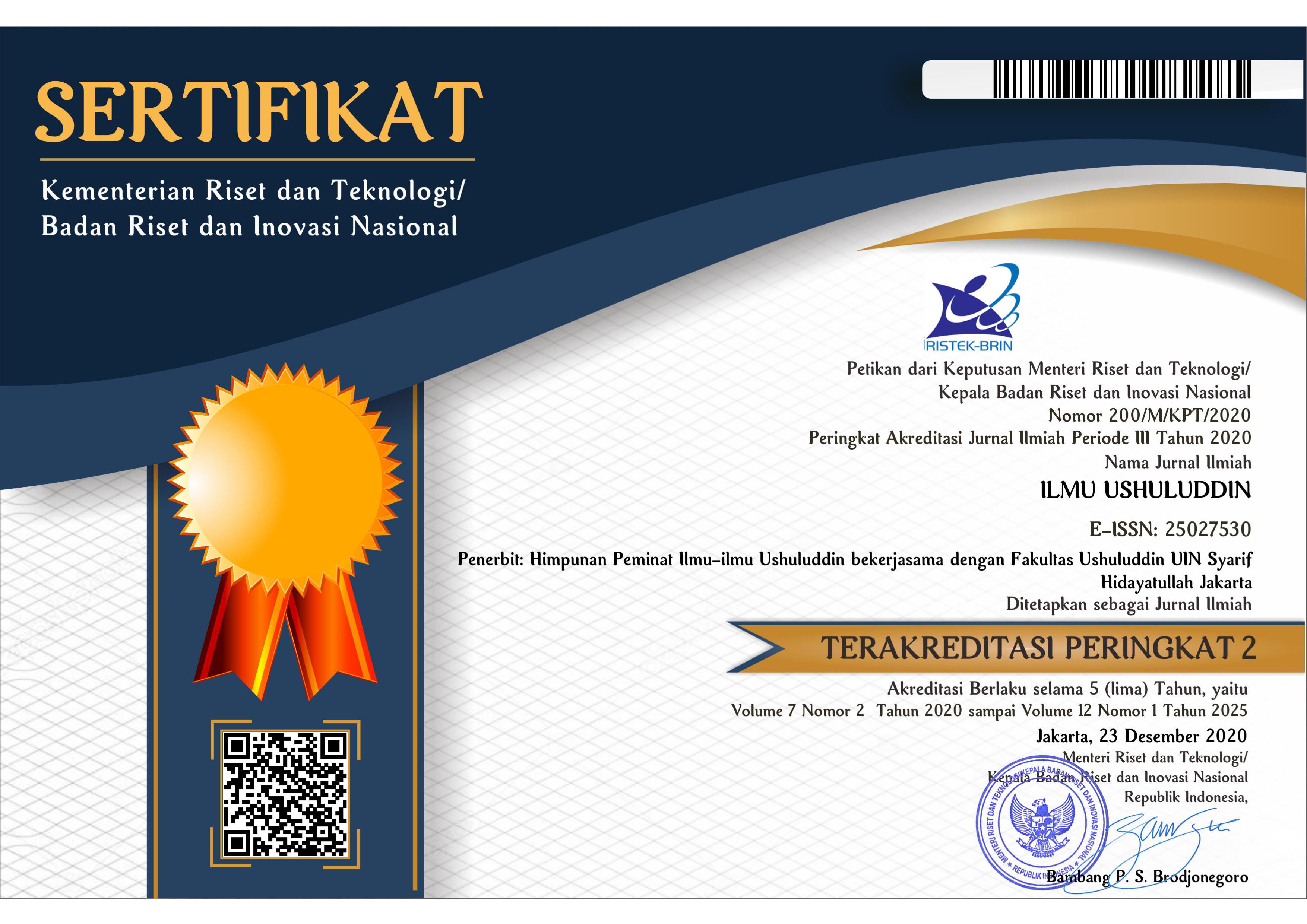AL-FARABI ON HUMANS
DOI:
https://doi.org/10.15408/iu.v9i1.29314Keywords:
Human Philosophy, Natural Philosophy, Al-Farabī, Materialism, SpiritualismAbstract
The Discourse about humans to this day continues to be actual and contextual and has always been an important issue. The question of who, what, and where humans are is still a matter of debate among scientists, philosophers, and theologians. In general, among philosophers, scientists, and theologians, humans are understood in three ways: First, the group that holds that humans are only material that occupies space, can be seen, touched, measured, counted, and so on. The second group is having a view that human nature is only the spirit. While the third group has a view that humans are made up of matter and spirit perfectly and simultaneously or consist of body and spirit (soul). This paper describes the thoughts of a Muslim philosopher, al-Farabī about humans. Al-Farabī is a Muslim philosopher who is known as al-Muʿallim al-Thānī (Second Teacher) after Aristotle who was nicknamed al-Muʿallim al-Awwal (First Teacher). An honorary title was given to him for his ability to review the thoughts of Greek philosophers, especially Aristotle. Humans according to Al-Farabī are two-dimensional beings. The physical dimension is in the form of a material body and the spiritual dimension consists of the soul (al-nafs) and spirit (al-rūḥ).References
Abidin, Zainal. Pengantar Filsafat Barat. Jakarta: PT.RajaGrafindo Persada, 2011.
________. Filsafat Manusia Memahami Manusia melalui Filsafat. Bandung: PT Remaja Rosdakarya, 2014.
Back, Deborah L. Al-Farabī dalam Ensiklopedi Tematis Filsafat Islam, Buku Pertama, Seyyed Hossein Nasr dan Oliver Leaman (ed). Bandung: Mizan, 2003.
Bertens, K. Sejarah Filsafat Yunani. Yogyakarta: Kanisius, 1999.
Al-Farabī, Abū Naṣr. Fuṣūṣ al-Ḥikam. Maṭbaʿah Amīr Intishārāt Baydār, 1394 H.
________. Kitāb Arāʾ Ahl al-Madīnah al-Fāḍilah. Beirut: Dār al-Masyriq, 2002.
________. Kitāb al-Siyāsah al-Madanīyah al-Mulaqqab bi-Mabādiʾ al-Mawjūdāt. Beirut: al-Maṭbaʿah al-Kātūlījīyah, 1964.
Fakhry, Majid. Al-Farabī Founder of Islamic Neoplatonism: His Life, Works, and Influence. Oneworld Publications, England, 2002.
Formm, Erich. Konsep Manusia menurut Marx, terj. Agung Prihantoro. Yogyakarta: Pustaka Pelajar, 2004.
Hamersma, Harry. Tokoh-Tokoh Filsafat Barat Modern. Jakarta: Gramedia, 1986.
Hartoko, Dick. Kamus Populer Filsafat. Jakarta: Rajawali Press, 1986.
Hatta, Muhammad. Alam Pikiran Yunani. Jakarta: UI-Press, 2006.
Khalidi, Muhammad Ali. Medieval Islamic Philosophical Writings. New York: Cambridge University Press, 2005.
Khobir, Abdul. Hakikat Manusia dan Implikasinya Dalam Proses Pendidikan. Jurnal Tarbiyah 8/1, Juni 2010.
Lapidus, Ira M. Sejarah Sosial Ummat Islam. Jakarta: PT. RajaGrapindo Persada,1999.
Maksum, Ali. Pengantar Filsafat dari Masa Klasik hingga Postmodernisme. Yogyakarta: Ar-Ruzz Media, 2009.
Murtiningsih, Wahyu. Para Filsuf dari Plato sampai Ibnu Bajjah. Jogjakarta: IRCiSoD, 2014.
Sartre, Jean Paul. Eksistensialisme Adalah Humanisme. terj. Cep Subhan KM, Yogyakarta: CV Jalan Baru, 2021
Nadir, Albir Nasri. Muqaddimah dalam Kitāb Ārāʾ Ahl al-Madīnah al-Fāḍilah. Dār al-Mashriq, 1986
Najati, Muhammad Utsman. Jiwa dalam Pandangan Para Filosof Muslim. Bandung: Pustaka Hidayah, 1993.
Nasution, Harun. Islam Ditinjau dari Berbagai Aspeknya Jilid II. Jakarta: UI-Press, 2016.
________. Falsafah dan Mistisisme dalam Islam. Jakarta: Bulan Bintang, 2014.
Nasution, Hasyimsyah. Filsafat Islam. Jakarta: Gaya Media Pratama, 1998.
Nolan, Titus, Smith. Persoalan Persoalan Filsafat. Jakarta: Bulan Bintang, 1984.
Sharif, M.M. A History of Muslim Philosophy with short Accounts of Other Disciplines and The Modern Renaissance in Muslim Lands. Volume One, Delhi: Santosh Offset, 1995.
Suseno, Franz Magnis. Pemikiran Karl Marx dari Sosialisme ke Perselisihan Revisionisme. Jakarta: PT. Gramedia Pustaka Utama, 1999.
Supriyadi, Moeflih Hasbullah dan Dedi. Filsafat Sejarah. Bandung: Pustaka Setia, 2012
Syamsuddin, Ahmad. Al-Farabī Ḥayātuhū Āthāruhū Falsafatuhū. Beirut: Dār al-Kutub al-ʿIlmiyah, 1989.
Asy-Syarafa, Ismail. Ensiklopedi Filsafat. Jakarta: Penerbit Khalifa, 2005.
Soleh, A Khudori. Wacana Baru Filsafat Islam. Yogyakarta: Pustaka Pelajar, 2004
Weij, P.A. Van der. Filsuf-Filsuf Besar tentang Manusia. terj K. Bertens, Jakarta: PT Gramedia, 1988.
Wolff, Jonathan. Mengapa Masih Relevan Membaca Marx hari ini? terj. oleh Yudhi Santosa Yogyakarta: Mata Angin, 2002.
Yahya, Harun, Keruntuhan Teori Evolusi, alih Bahasa Catur Sriherwanto, Bandung: Penerbit Dzikra, 2000.



